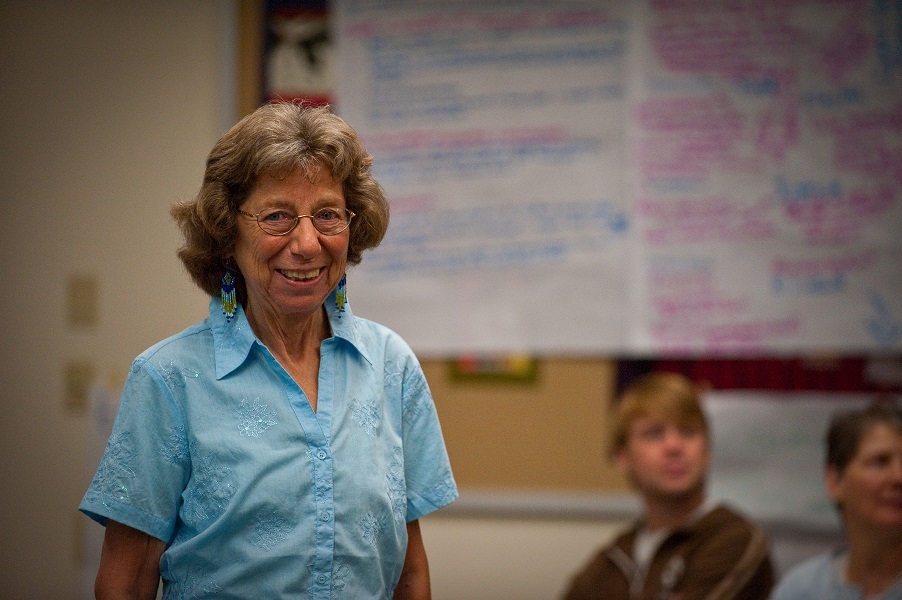It’s time to strengthen community and declare peace
We have a window of opportunity
April 24th, 2020
By Dr. Paula Green
This article originally appeared in The Hampshire Gazette. It is reprinted here with permission.

The secretary general of the United Nations has issued a plea to the countries of the world to declare an immediate ceasefire.
“The fury of the virus illustrates the folly of war,” António Guterres said on March 22. “Let us dedicate ourselves to the real fight, which is not with each other, but is to protect our health and the health of our planet.”
Can we heed his plea, acknowledge more fully than ever our profound and indisputable interdependence, and seize this perilous moment as an opportunity for broad and deep societal change? How much more evidence could we need? Borders and boundaries do not protect us. Position and privilege may not keep us from harm. No country or village is too far away. We are all vulnerable to this virus.
Life offers each of us more than enough suffering without armed conflict. Let us require our governments to respond to the secretary general with their national commitments to end armed conflict. We can put our trust in the tools of diplomacy and band together across nations to alleviate the anguish of wars. Seeing through the delusions of separateness so clearly helps us mobilize for the transformation to a human race at peace with itself and the planet we share. An aware and empowered populace will hasten this change.
This juncture provides an opening to rethink our values and behaviors, to recreate societies that reflect altruism and peace. Many whose lives are comfortable are now discovering how to live with a lot less, and as we diminish our greed, we reduce one of the major causes of war.
The current reduction of human activity forced by this coronavirus enables the earth, scarred with pollution and toxins, to begin to purify and renew itself so that in the future rivers will sparkle and stars glitter. Just as the soil, water, and air around us recovers from some of its poisons when we cease our frantic consumption, perhaps we humans, especially those with the privilege of slowing down, will accept the challenge to renew and liberate ourselves as well.
This juncture provides an opening to rethink our values and behaviors, to recreate societies that reflect altruism and peace. Many whose lives are comfortable are now discovering how to live with a lot less, and as we diminish our greed, we reduce one of the major causes of war.
Might we now give up on the illusion that we are rugged individuals and proclaim our interconnectedness? We all crave contact, which we currently attain in dystopian fashion on Zoom. In being present for each other, even electronically, we strengthen our common humanity and social solidarity. We find ways to nurture and weave our precious human web, to remember that our human needs are universal, and that our generosity is a gift that ripples out and reproduces itself.
As we engage locally, we extend our concern to those millions of us who are vulnerable, perhaps experiencing increased economic hardship, political repression, the scourge of racism, the pain of exclusion, or health difficulties.
The climate crisis, appalling inequality, the destruction of our earthly home and its flora and fauna, are all powerful evidence that our ways of organizing society are dangerously outmoded. Social change emerges slowly and invisibly, yet the new is always fermenting within the old.
... we do not serve ourselves or our society by focusing on our fears. Focus instead on what your awakened and discerning self can see and do. This planetwide virus, tragic as it is, has the potential to galvanize multitudes.
Eventually, the old ways fracture and new realities will burst forth. Our minds, burdened by the fear and endless battles of our politics, can take us to negative images of increased authoritarianism, militarism, xenophobia and injustice. Many will be pushing for that kind of social order, and we have to organize mightily against their demands, beginning now.
But we do not serve ourselves or our society by focusing on our fears. Focus instead on what your awakened and discerning self can see and do. This planetwide virus, tragic as it is, has the potential to galvanize multitudes. Once awake, there is no returning to delusions like walls, borders, hatreds, or an us-them mentality. Once conscious, we are all “us.”
We are each citizens of the community of life and everything we do matters in the universe. Our visions and actions are the building blocks of the community and the world we deeply wish for. We prepare for its arrival as we make the most of this potentially transformative moment.
Dr. Paula Green is founder of Karuna Center for Peacebuilding and currently guides the Hands Across the Hills dialogue project. She is Professor Emerita at School for International Training, where she founded the Conflict Transformation Across Cultures (CONTACT) program in 1997. Working internationally in zones of conflict, she observed the need for those experiencing war and its aftermath to speak directly to each other, sharing strategies for rebuilding their shattered societies. During the first year of CONTACT there were 10 participants; by the third year there were 60 to 70 participants each June on the SIT campus ranging in age from 20s to 70s. The program expanded to five African countries encompassing most regions, and to Nepal, especially for South Asians. Dr. Green retired from SIT after the 2015 CONTACT program, which lives on under the directorship of Dr. Bruce Dayton. CONTACT graduates are now leaders in their own countries, working for peace and justice while healing the wounds of war. Click here to learn more about the program.
